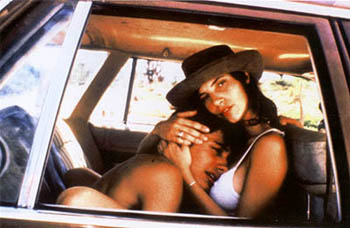![[Metroactive Movies]](/movies/gifs/movies468.gif)
[ Movies Index | Show Times | Santa Cruz Week | SantaCruz Home | Archives ]
 Photograph by Daniel Daza Life in the Fast Lane: Gael Garcia Bernal can't get enough of Maribel Verdu in Y Tu Mamá También. Road Trip 'Y Tu Mamá También' looks at modern Mexico through a sexy lens WHO CAN LOOK at Mexico and believe that someday there will be peace there--that someday there will be justice? For too many years, the Mexican cinema has reflected such hopelessness by being a cinema of straight escapism, melodrama or religious pathos. Out of this background comes Alfonso Cuarón's witty, peppery Y Tu Mamá También. This film will sell itself; it's enormously sexy. But let's be plain: Y Tu Mamá También is the most revolutionary film to come out of Mexico since Luis Buñuel's Los Olvidados. Audiences are prepared for a new and bold Mexican cinema because of the success of the highly violent Amores Perros, but Y Tu Mamá También is a better-realized film; all other things being equal, sex, rather than violence, is a more precise artistic tool with which to take apart a closed-up society's lying and blindness. Though people mourn when they say "sex sells," they forget that sex can sell something really worthwhile--and you're not likely to see anything so worthwhile this season as Y Tu Mamá También. The two anti-heroes are school kids on summer break. Both are as superficially liberated as young machos of about 17 can be. One, Julio (Gael Garcia Bernal), is an aspirant to the upper class, apparently attending a rich kid's school on scholarship. His friend Tenoch (Diego Luna) is born to the PRI purple. The two kill time by drug-bingeing and lolling around the country club. One day, while suffering through a dull party in honor of the president of Mexico, Tenoch runs into his cousin Jano (Juan Carlos Remolina Suarez), a celebrated novelist. The man's dandy white suit exposes him as a whited-sepulcher of an artist--never mind his presence at this party of government stiffs. However, Jano is escorting a very interesting girl: Luisa from Madrid (Maribel Verdu), a lean woman with an overbite that amplifies her Castilian lisp. The boys, bent on seduction, talk Luisa into accompanying them on a trip to a mythical beach. On the road, the two try to out-seduce each other; they're like downy chickens pretending to be fighting cocks. "Play with babies, you'll end up washing diapers," Luisa complains after tiring of their boasting. While they scheme, fret and twist themselves into jealous knots around Luisa, the decline of Mexico goes on around them. These two boys are nothing if not Mexican. Yet they're so out of it, such tourists, that they might as well be gringos. The three head out from the mountains across Mexico to the ocean in a borrowed car. With true Flaubertian impassivity, the narrator points out all the sights the boys are missing: the remote, wretched village where Tenoch's nanny came from, the sight of a chicken farmer's fatal crash 10 years ago, marked by a sad plastic cross covered with artificial flowers. Still, Cuarón identifies with the boys' playfulness. It's as if Tenoch and Julio were swimming their way to the ocean, from a country club pool to a leaf-covered cement pond at a beat-up motel patio and, eventually, to the clean waters at the beach. They really do get to a paradise. And like so many other Mexican paradises, it's in immediate danger of being fouled and paved. While the movie shares the trio's pleasure, it doesn't endorse the empty-headedness of Julio and Tenoch. And yet they're really acting like rude jackasses, showing off in front of some simple peasant people. You cringe for them. And here's where Y Tu Mamá También stops being a Mexican movie and becomes universal. For that matter, Y Tu Mamá También could be just as easily done in America; it's just as possible here to see young bravos in complete ignorance of the poor people who clean them and serve them. This film shows how young men can be cool party-hearties and still passively prop up every conservative system they profess to hate. Cuarón has often referred to Mexico as "a teenage country." Y Tu Mamá También has the vividness of teen movies, with the comic rush of first lust and escape from authority. Yet it goes so far beyond anything the youth market gets today that you can only compare the impact of watching it to what it must have been like to see a French New Wave film among the context of the typical 1960 Hollywood cinema. Every other movie made today is a teenage wild-kid rebel movie but turns out to reinforce the usual dull structures. This import blows them all away, for adventure, sexual thrill and political satire.
Y Tu Mamá También (R; 105 min.), directed by Alfonso Cuarón, written by Carlos and Alfonso Cuarón, photographed by Emmanuel Lubezki and starring Diego Luna, Gael García Bernal and Maribel Verdu, opens Friday at the Nickelodeon in Santa Cruz. [ Santa Cruz Week | Metroactive Central | Archives ]
|
From the April 3-10, 2002 issue of Metro Santa Cruz.
Copyright © Metro Publishing Inc. Maintained by Boulevards New Media.